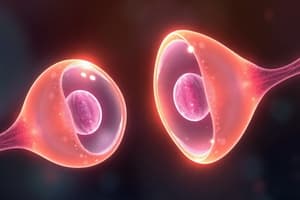Podcast
Questions and Answers
What term refers to an organism that produces both male and female gametes?
What term refers to an organism that produces both male and female gametes?
- Hermaphrodite (correct)
- Dimorphic
- Monomorphic
- Isogamous
In which sex-determination system do most mammalian species have the male carrying an X and a Y chromosome?
In which sex-determination system do most mammalian species have the male carrying an X and a Y chromosome?
- XY system (correct)
- ZW system
- XX system
- XO system
What is the term for physical differences between male and female of a species?
What is the term for physical differences between male and female of a species?
- Hermaphroditism
- Sexual monomorphism
- Sexual dimorphism (correct)
- Isogamous
Which sex-determination system is found in birds?
Which sex-determination system is found in birds?
In sexually undifferentiated species, individuals are isomorphic and gametes are isogamous. What does 'isomorphic' refer to in this context?
In sexually undifferentiated species, individuals are isomorphic and gametes are isogamous. What does 'isomorphic' refer to in this context?
Flashcards are hidden until you start studying
Study Notes
Organisms and Gamete Production
- An organism that produces both male and female gametes is termed hermaphrodite. This allows for flexible reproduction strategies.
Mammalian Sex-Determination
- In most mammalian species, the sex-determination system involves males carrying an X and a Y chromosome. This XY system determines male characteristics.
Sexual Dimorphism
- Sexual dimorphism refers to the physical differences between male and female members of the same species. This can include size, coloration, and the presence of secondary sexual traits.
Bird Sex-Determination System
- Birds employ a ZW sex-determination system, where females have a ZW genotype and males have a ZZ genotype. This is distinct from the XY system found in mammals.
Isomorphic Species
- In sexually undifferentiated species, the term isomorphic indicates that individuals have similar forms or structures, lacking distinct male and female characteristics. In this context, organisms are functionally similar despite gametic differences.
- Isogamous refers to the production of gametes that are morphologically similar, contributing to the lack of sexual differentiation.
Studying That Suits You
Use AI to generate personalized quizzes and flashcards to suit your learning preferences.




